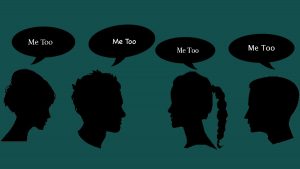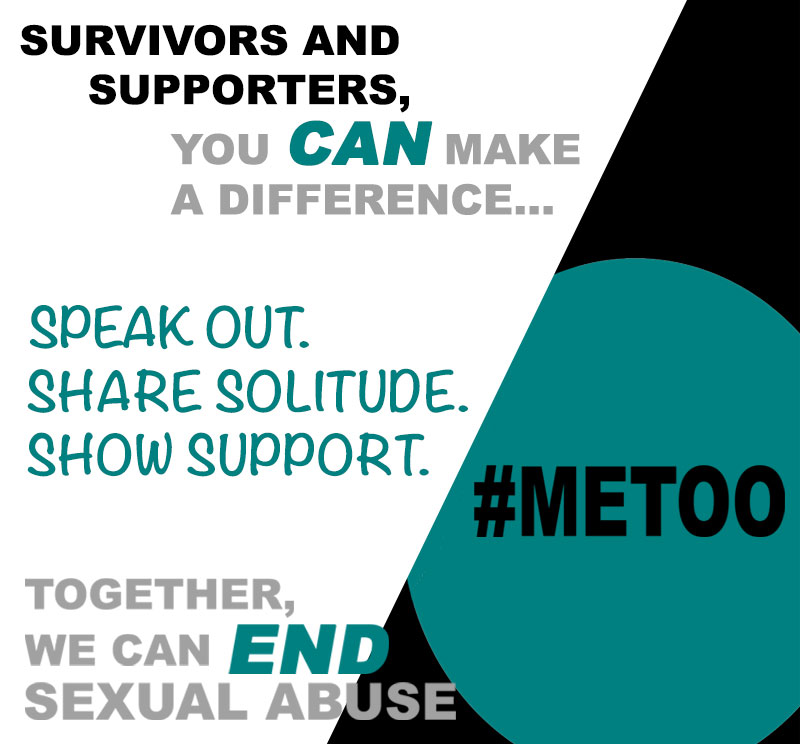
Actress Alyssa Milano, best known for her role as “Phoebe” in the television series “Charmed”, took to Twitter Oct. 15 in response to the numerous sexual abuse allegations against American film producer and former film executive Harvey Weinstein.
Women in and out of Hollywood have come forward regarding Weinstein’s behavior, such as actresses Rose McGowan, Ashley Judd, Jessica Barth and many of Weinstein’s former female employees. Milano’s tweet began the global collaboration of sexual assault survivors from more than 85 different countries by the use of one, seven-character hashtag, “#MeToo.”

Founder of Just Be Inc., Tarana Burke, created a campaign in 2006 called, “Me Too.” Originally, the movement was created to help young women of color find healing through the idea of “empowerment through empathy.” However, the Me Too. website states, “the ‘Me Too.’ movement has built a community of survivors from all walks of life.”
More than ten years later the “Me Too” movement has amplified and united more than 1.7 million victimized survivors across the world.
Emily Fessler, assistant professor of family therapy, said the #MeToo movement is both remarkable and powerful.
“My understanding of the intended message is that is it two-fold—on one hand, the participants that share #MeToo are making a bold—and public—statement that they are a survivor, that they are not ashamed to share, and reaching are out to others to not feel so alone,” Fessler said. “On the other hand, it can be a powerful way for survivors to connect with one another in a larger, global sense. It’s a way to look at another survivor and say, ‘I see you, I hear you, I get it. I’m here.’”
Social Media, especially Twitter, has proven to be an effective communication outlet, as survivors continue to utilize the “Me Too” phrase. Some survivors are coming forward decades after their abuse.
“Social media can be a space in which support and solidarity can be amplified as you can connect with others throughout the world,” said Amy Lucas, assistant professor of sociology.
The countless women who have come forward have encouraged men to speak out about their abuse as well, such as actor Anthony Rapp. Following Milano’s tweet, Rapp posted the “Me Too” hashtag and shared his story accusing actor Kevin Spacey of sexual assault when Rapp was 14.
“Male survivors can feel alienated and invisible in discussions of sexual assault, because implicit bias often impacts people’s ability to even recognize that a male can be a victim of sexual assault, not just a perpetrator,” Fessler said. “Therefore, when a male speaks out about being a survivor of sexual assault, he may be faced with people not believing that it happened, or thinking that he should have been able to physically overcome the perpetrator of the assault simply because he’s a guy.”
Fessler clarifies that there are scenarios just as unfortunate for female survivors. She explains that women fear they will receive feedback which will make them appear as though they put themselves in the position to be assaulted.
“Regardless of the sex of the survivor, it is clear that there are many barriers that would keep someone quiet after experiencing a sexual assault,” Fessler said. “This #MeToo campaign is creating space for people to speak out, to offer support, and find community and hopefully healing.”
Rape, Abuse & Incest National Network (RAINN) states on its website that 1 in 6 American women and 1 in 33 American men will be survivors of an attempted or completed rape in their lifetime.
“My understanding of the current statistics is that somewhere between 1 and 3 or 1 and 4 people are victims of sexual harassment or assault during their lifetime,” Fessler said. “Think about it: if there are 24 people in your class, that means that, according to the statistics, 6-8 of them have been assaulted, or will be at some point in their lives.”
On the other hand, statistics show women are at greater risk for sexual abuse in the workplace because power is predominantly held by men in the work industry.
“In the ‘30s and ‘40s and ‘50s, generally, my mother’s generation, you just sucked it up and moved on, because it’s just what men did,” said Angela Howard, professor of U.S. and women’s history. “That included going all the way to sexual assault as well, but it’s not something you could make a complaint about because, ‘boys will be boys.’”
Charnel Hollier, psychology intern and doctorial candidate, explains that both men and women survivors respond differently to sexual abuse as the emotional and psychological trauma has long-term effects.
“Long term psychological effects of sexual assault include Post-traumatic stress disorder (PTSD), depression, substance abuse disorders, eating disorders, self-harm, dissociative symptoms, and anxiety,” Hollier said. “Survivors are more likely to have issues relating to trust and intimacy in current and future relationships.”
Though social media is exploding with survivor’s stories, there are factors hindering countless survivors from coming forward through the “Me Too” movement. For some survivors, the campaign brought back painful memories.
“Despite wanting to show support, others expressed fears that sharing these stories would put them in a position to have to explain themselves to employers, family, and friends,” said Diana Bowen, assistant professor of communication and affiliate faculty member of the women’s studies program. “Given this line of reasoning, the conversation would move forward at the expense of the women and men who have been hurt by putting them in situations in which they have to relive these experiences and giving up their privacy in the process. I want to emphasize the importance of the #metoo campaign while remaining mindful of people’s choices to join in or not.”
As survivors are communicating with those who can truly share solidarity and understanding, Burke’s goal for survivors is effective now more than ever.
“It was a catchphrase to be used from survivor to survivor to let folks know that they were not alone and that a movement for radical healing was happening and possible,” Burke expressed during an October 2017 interview with Ebony magazine.
“As long as you’re quiet, you’re ashamed, and as long as you’re ashamed, you’re diminished,” Howard said.
Howard also discussed passive bystanders who may feel intervening is not their place because it is none of their business. Howard expressed that regardless if it is your business or not, if you know someone who is vulnerable to sexual abuse, you need to protect them.
“You can’t be a bystander,” Howard said. “You have to do right and fear not. If you see something, you say something. If it works for national defense, it also works for an individual.”
Corey Benson, Title IX coordinator at UHCL, points out that those who witness sexual misconduct can often prevent or reduce harm by intervening, if safe for them to do so.
“If you observe a dangerous situation that may put another person at risk, you can call the UHCL Police Department to report the incident, so that they can respond and make sure all involved are safe,” Benson said.

Sexual assault reaches everyone, even here at UHCL. In an effort to bring campus attention to the issue of sexual harassment, assault, and/or abuse, The Signal is coordinating a #MeToo series by collecting statistical data, personal experience stories and/or messages of support. The Signal staff set up “Me Too” boxes throughout UHCL encouraging survivors and supporters to anonymously participate. The boxes are located in Bayou Building Atrium I, the SSCB student lounge, the Delta lobby and the Arbor lobby.
Additionally, there is an online form available. The boxes will be available through Dec. 1 and the online form will be open indefinitely.
